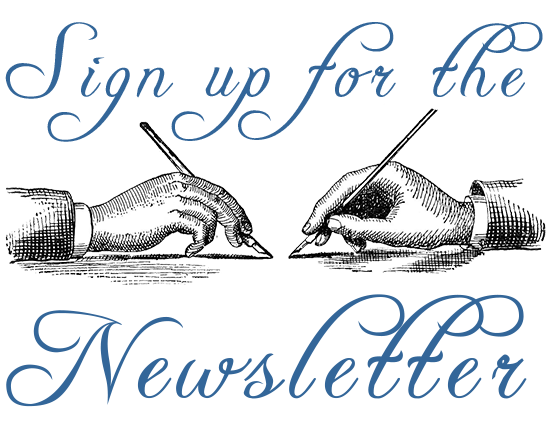Last Updated on June 10, 2023
You’ve probably seen the period dramas “An Ideal Husband” and “The Importance of Being Earnest,” both starring Rupert Everett. Maybe you’ve read the original plays that inspired the movies. But how much do you really know about their Victorian author, Oscar Wilde?
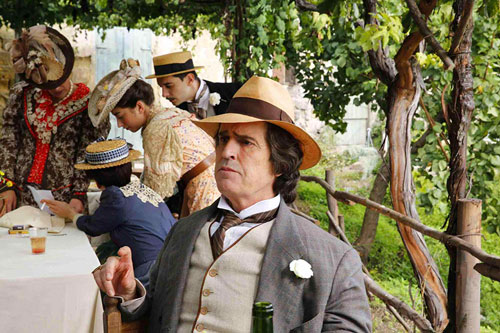
To help keep this site running: Willow and Thatch may receive a commission when you click on any of the links on our site and make a purchase after doing so.
In a new period drama, Rupert Everett pays tribute to the Irish writer. Set at the close of the 19th century, “The Happy Prince” (also the title of Wilde’s children’s story) is a chronicle of Oscar Wilde’s dramatic last days. Everett plays Wilde himself, but he also wrote and directed the movie. “The Happy Prince” also stars Colin Firth, Colin Morgan, Edwin Thomas, Emily Watson, and Tom Wilkinson.
Watch the trailer below, and read what Rupert Everett had to say when Paulina Enck sat down with him to discuss his nuanced portrayal of the legendary free thinker.
“The Happy Prince” (2018) is AVAILABLE to STREAM

Paulina Enck: One of the first things I noticed watching this film was how your script captured Oscar Wilde’s distinctive voice and style. How did you go about encapsulating this in your script?
Rupert Everett: I think I was very lucky in one sense to have first of all to have done lots of Wilde in the theatre. When you do theatre you do it over and over again, so you really get used to the phrases, the way they’re constructed, the length of them, and the words and the humor. I played in “The Picture of Dorian Gray” as Lord Henry, and he’s very like Oscar as a character. Then I played in “The Importance of Being Earnest” as Algy, and he’s like Oscar in a way as a character, too, so that was a very lucky learning curve for me. Also, being in the two screen adaptations helped me a lot.
PE: You’ve been working on “The Happy Prince” for a very long time. What inspired you to make this movie about this period in Oscar’s life?
Rupert Everett: I was partly inspired because the other movies take you up to this point and stop, and secondly, because I felt there was more to explain to people about Wilde. People enjoy Wilde but they don’t understand what society did to him.
I thought the other films rather conveniently stop when it gets too awkward, but I thought now is the time to remind people, particularly coming to [Donald] Trump’s America, what society did to Wilde, not only in the punishment, but the apres punishment, which was a pretend liberty, but was in fact another kind of imprisonment, a more tortuous one in a way. Freedom was pretty depressing too, so that’s what inspired me to write about this period. Plus, for me, this idea about a rock star on the skids ending up as the last great vagabond of the 19th century is romantic and exciting and for me very important.
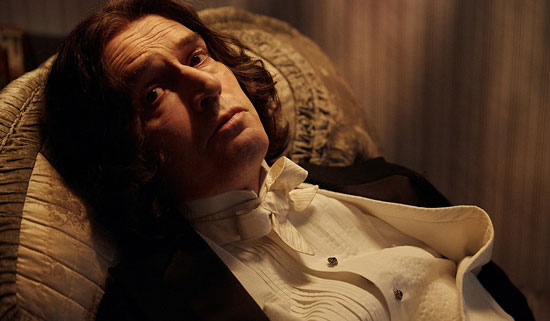
PE: There is an interesting contrast in the film between the psychological and the societal imprisonment, highlighted in the scene where Robbie and Oscar are attacked by the young men. Could you contrast the two and elaborate on how you played with both of those ideas?
Rupert Everett: My principal idea is that liberty for Oscar was incredibly short-lived, and all his notions of rehabilitation and everything went by the wayside when he went to Dieppe. He had not counted on the English being everywhere. Having him removed from bars, having him nearly removed from the hotel, because, after he’d had the dinner with the poets, they’d received a letter about who he was. Finally, being chased across Dieppe by the boys, he realized there wasn’t going to be any liberty.
He was always going to be on the run, and the run started with him going to Barneveld, a tiny little hotel on the countryside. When I visited that place at one point during preproduction, it’s an amazing place because to the right of Dieppe are all these plains, they’re beautiful farmlands, flat, then you go down all these gullies, and the seas on these pebble beaches. It’s incredibly beautiful, Barneveld, but it’s an incredibly lonely place. It’s full of trees, the gullies, so it’s got a sort of underwater feel.
I could imagine so clearly getting there, how all his good intentions must have collapsed under the weight and the depression of being in that place so isolated. He goes on the walk up the hill. That’s inspired by a letter he wrote about going on the same walk, “I go there everyday. It takes three minutes to get there and three minutes to get back.” It was immensely inspiring because I realized, when I went on the walk myself up the hill, that it was rather like going for a workout, that he was just trying to keep going so he was ready to go on, but little by little, his energy completely flagged. At the same time, he was getting all those letters from Lord Alfred Douglas. Finally he went back to Lord Alfred Douglas, and at that point, the world really just zipped up behind him and that was it. No chance of rehabilitation.
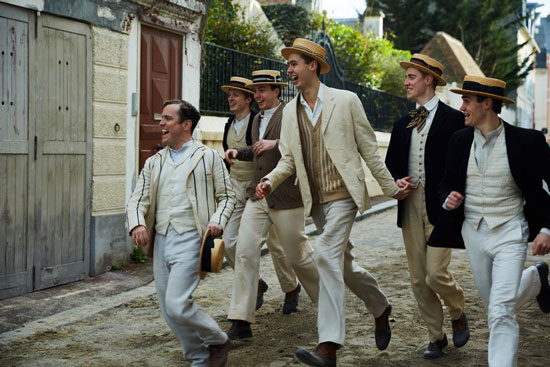
PE: It seemed as if, historically and in the film, the reunion with Bosie was a major turning point – the beginning of the end for Oscar.
Rupert Everett: There was no chance. Once that had happened, there was no way back; from everything else, there had been some way back. Even from prison, because there’s redemption after prison, but once he’d gone with Bosie to Naples, that was it.
PE: The way the film explored relationships was really fascinating, particularly the relationship between Oscar and Bosie. You really see how toxic it is but also why they keep going back to each other. Can you explain how you went about capturing that really complicated dynamic?
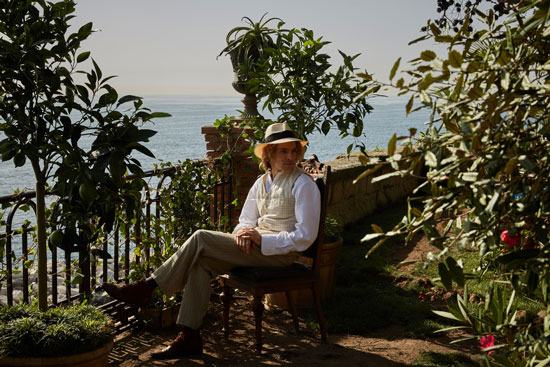
Rupert Everett: I didn’t want Bosie just to be a villain character, because he wasn’t for me. He’s a young boy, really, who wanted to have fun, and had been with someone who was very rich, and he’d exploited him, OK, but that’s not the end of the world.
The relationship going wrong is just as much Oscar’s fault as his. If you put everything in the hands of someone who’s unbalanced, you have to take responsibility, and Oscar did that. So, I didn’t want him to be just horrible, and I wanted, when they met at the station, for us to get the impression that, for the first time in the film, they were having a laugh and they enjoy each other, and you can see, I hope, why they like being with each other.
And then, really quickly, the relationship goes wrong, but it’s not altogether Bosie’s fault. It’s just he’s not capable at his young age. Most young people are quite selfish. You learn not to be selfish through experience. I didn’t want him to be a horrible character until the very end.
And also, by the end of the movie, you haven’t seen before, but he’s become very exploitative, Oscar. He’s touching everybody for money. He’s telling everyone the same sob story. He’s telling everyone he can’t afford to live. I think a lot of people lost their temper with Oscar, because they couldn’t imagine how impossible it was for him to act or do anything or to write. They kept telling him, “You’ve got to write. You’ve got to write. You’ve got to write. You’ve got to write.” And he couldn’t explain to them why it was impossible.
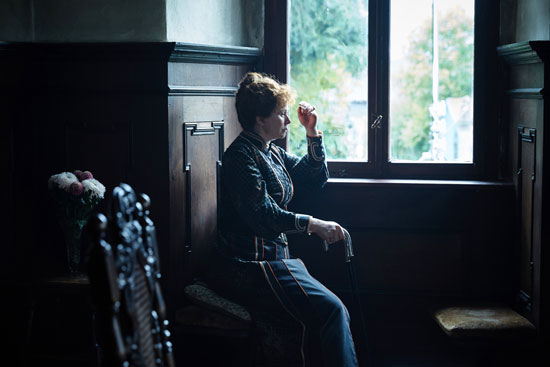
PE: There were several moments in the script in which you and your costars would say lines that you had said in previous film, such as when Oscar told Bosie, “Ill met by moonlight, proud Titania,” from “Midsummer Night’s Dream,” and the flashback to a performance of “The Importance of Being Earnest” where Colin Firth played Colin Firth’s role from “The Importance of Being Earnest.”
Rupert Everett: I felt very excited about the eclipse, at least for Colin and me, with our first film, “Another Country.” For me, I was hoping it would add a kind of emotional texture to the thing already, because I dress him in a similar way, in the scene where we’re in the room together, like one of the scenes where we’re in our study in “Another Country.” For me it was exciting to continue with Colin playing his same part in “The Importance of Being Earnest” when my character is sort of hallucinating and not fully understanding what’s going on.
PE: Was there an intentional callback to “Another Country” throughout the film in the relationship between Reggie and Oscar?
Rupert Everett: It was something I had hoped to do if I had managed to get Colin to play the part. Essentially, he kills Oscar in a way because he says to him, “You should go out for a drive,” and on that drive he gets the cold that turns into the meningitis that kills him. And that actually did happen. So I loved the idea of Colin being the angel of death character in a way, a loving one. And also, for anyone who had enjoyed our first film both him and I did, it’s a very emotional thing to see where we’ve come to. And he’s such an amazing actor, and all those things for me; they add texture to the whole thing somehow.
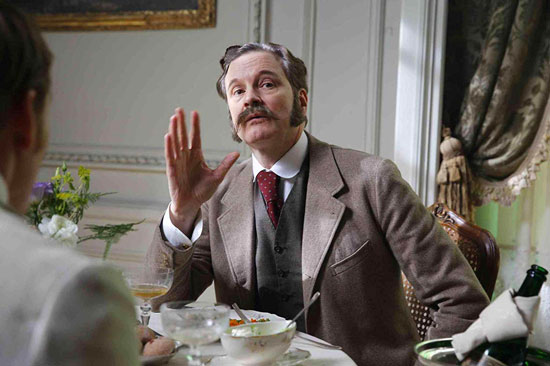
PE: There were several scenes depicting this excessive absinthe-flowing party life. Some scenes look happy and fun, while others look almost bleak and empty. How did you balance that exploration and was there any underlying message in the ups and downs of the harder-partying style?
Rupert Everett: Party style is always full of ups and downs. If you’ve been a party person or a clubber, as I certainly was, there’s ups and downs, life and death. I think, for example, in the film, obviously the juxtaposition of Oscar’s Christmas party and his family’s Christmas party is quite troubling in a way. On the one hand, it’s funny, but on the other hand, it’s not funny at all. On the other hand, it’s very sad.
And then that turns, as Oscar calls it, “feasting with panthers,” so you never knew when that part of the party, when anyone was going to turn or what’s going to happen. The result being, in the film, Fellice about to kill Bosie because he hasn’t paid him for sex. Again, for me, all this is rather romantic and exciting. I realize I’m probably in the minority.
PE: There’s definitely a romanticism to the heightened drama and intrigue.
Rupert Everett: Yes, it’s like Wagner. And, you know, the two of them living in that funny, kind of craggy castle above the water, and having bottles broken, and you know some guy saying “I’m going to kill you” is tremendously exciting as well. But partying always ends up getting messy, I think.
PE: How did portraying Wilde at this same phase in his life live in the play “The Judas Kiss” affect your portrayal in “The Happy Prince?”
Rupert Everett: I think it helped a lot. I did “The Judas Kiss” because I was finding it so difficult to get money for the film, and then I got the idea. I had seen Liam Neeson in “The Judas Kiss,” and then I thought that maybe I should play “The Judas Kiss” and I could show to people that I’ve got an angle on Oscar. So, David [Hare, the play write of “The Judas Kiss”] very kindly gave me permission to set up the play and I did it. The thing is, I’ve always had this angle on Oscar. I felt I knew instinctively what I wanted to do with him, so my approach to Oscar didn’t really change with “The Judas Kiss.” David’s version of Oscar is probably more reverential as probably only a heterosexual man writing about someone like Oscar probably should or could be, but he writes an amazing Oscar. I don’t think there’s much difference in the two characters in that way.
PE: Much of the film focuses of the characters’ relationships and complicated dynamics, and the chemistry between the cast is so effective. How did you, as a writer and a director, go about fostering the relationships between the characters?
Rupert Everett: I once read a quote by Mae West saying, “You should always surround yourself on film with people who love you, because then, if you can’t act, they’re all looking lovingly at you, and then something rubs off.” So I thought, “I have to get friends involved and people who will really help me.” The thing is, they’re all so nice to me, and I think that rubs off on the film somehow.
The care and attention they all took just to show up and be there, and play so effectively, and I think you get an amazing feeling of the camaraderie between Oscar and everybody thanks to all those actors. Even the small parts, they’re played by wonderful, overqualified actors from the UK. Even the old doctor, John Standing, is a very famous older actor in our country. Tom Wilkinson as the priest is amazing. And, that was very lucky for me. I don’t know, if I do another film, if I’ll be able to call those favors in again without paying them a lot more money.
PE: The relationships seem to be one of the driving forces of the film. Can you explain how you fleshed those out for the narrative?
Rupert Everett: I made a quick decision right at the beginning, because I wanted the relationship with Bosie to be kind of demystified and for the real relationship to come into focus, which, for me, is the relationship between Robbie Ross and Oscar Wilde.
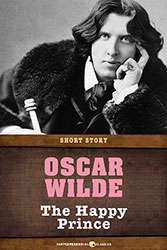 It was Robbie who actually introduced Oscar to homosexuality, who continued an affair with him all the way through on and off. Robbie was always the one Oscar would come to if he, you know, didn’t have another boyfriend, and they even restarted their affair when Oscar arrived in France, but Oscar really either couldn’t accept Robbie’s love, I don’t know what it was, or couldn’t accept love in general, maybe, until it was too late.
It was Robbie who actually introduced Oscar to homosexuality, who continued an affair with him all the way through on and off. Robbie was always the one Oscar would come to if he, you know, didn’t have another boyfriend, and they even restarted their affair when Oscar arrived in France, but Oscar really either couldn’t accept Robbie’s love, I don’t know what it was, or couldn’t accept love in general, maybe, until it was too late.
So the real story of the film for me was always about a character who has love, which is a subject he talks about nonstop, but actually he can’t see it underneath, or he just walks past it, and it’s only realized for him at the very last minute when he’s dying. The only fruit of it is conversion to the Catholic faith, rather than a lifetime that could have been quite fun.
“The Happy Prince” (2018) is AVAILABLE to STREAM
Paulina Enck writes for The Hoya.
Rupert Everett first appeared on stage in 1981 as Guy Bennett in the West End production of Julian Mitchell’s play ANOTHER COUNTRY, a role which he repeated, alongside Colin Firth, in the 1984 film version directed by Marek Kanievska which saw him nominated for a BAFTA as Best Newcomer To Film. Rupert followed up with another British film, 1985’s DANCE WITH A STRANGER, with Miranda Richardson and Ian Holm, in which he played the lover of Ruth Ellis, the last woman to be hanged in Britain.
Rupert’s appearances in period dramas include THE MADNESS OF KING GEORGE, SHAKESPEARE IN LOVE, AN IDEAL HUSBAND, THE IMPORTANCE OF BEING EARNEST and STAGE BEAUTY. Everett’s period-set television work includes PARADES END and the role of Sherlock Holmes.
In 2008, his documentary THE VICTORIAN SEX EXPLORER retraced the steps of Sir Richard Burton, the infamous author, explorer and sexual adventurer.
If you enjoyed this post, be sure to see The Period Films List, with the best British, historical and costume dramas sorted by era.


